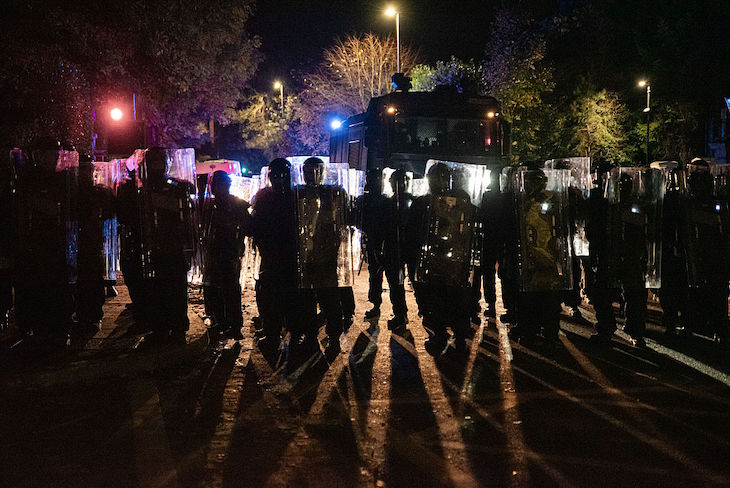It’s hard to overstate just how shocking, how grotesque and shaming, was President Trump’s outburst against Ukraine’s President Zelensky in the Oval Office. Pop went the last soap-bubble of hope any of us had that US diplomatic policy for the next four years would cleave to anything other than the mad king’s personal whims and grievances.
“Goodies and baddies” is exactly how liberal democracies do see the world
The personal stuff – the petulance and bullying – is priced in with Donald Trump. But the wider drift of what’s happening is, in a way, more alarming. Historians and international policy experts seem to agree that we’re at an inflection point: the chapter is closing on the “Western alliance”, Nato and the so-called “rules-based international order” guaranteed by American power; in its place we’re returning to the primordial condition of great-power competition, spheres of influence, and colonial exploitation.
Trump’s pash on Russian power looks psychological rather than strategic, and it would be funny if it wasn’t so horrifying: in Michael Wolff’s new book All Or Nothing he makes the passing observation that Trump’s worldview is stuck in 1965. That’s in the context of him thinking being on the cover of Time magazine was a huge deal; but it strikes me that it could equally apply to his seeing Russia as a great power with a natural sphere of influence over central and eastern Europe rather than the vicious basket case it is now. Donald Trump’s calculation of his country’s, or his own, interests may be entirely cockeyed because he’s Donald Trump: but it’s clear that calculation of interest is the only game in town now.
Thucydides had the curtest statement of that worldview: “The strong do what they can and the weak suffer what they must.” As Tom Holland has argued, the great distinction between the ancient world and the modern, mediated through the arrival of New Testament Christianity, is the idea that the weak might deserve a look-in. Through most of history, this would have looked like a distinctly bizarre idea. It is, after all, a moral position rather than a pragmatic one.
What we had until a couple of weeks ago, at the level of retail politics, was the luxury of thinking about international relations in terms of goodies and baddies, rather than might makes right. That’s the fork on which poor Sir Keir Starmer is toasted. In his worldview, Ukraine are the goodies and Russia are the baddies, and – broadly – the goodies stick together against the baddies. But how – with America no longer taking any sort of moral position – is that to be squared with a calculation of our national interest?
Would-be sophisticates will scoff at the naivety of framing this as “goodies and baddies”. But “goodies and baddies” is exactly how liberal democracies do see the world. German fascism of the 1940s remains a rhetorical touchpoint because we see it as a unique historical evil, not because we see it as a suboptimal form of government. George W. Bush spoke of an “axis of evil”, and Reagan of an “evil empire”. I hope readers will agree that when I describe Trump and Vance’s Oval Office outburst as grotesque and shaming I am right to be framing the issue in moral terms.
Inasmuch as the US has supported Ukraine, and we and our European neighbours still do, it’s because we think that invading a sovereign state is wrong, and that we express a moral preference for a democratic nation to a murderous kleptocracy. The unique claim democracy has on us as a form of government is a moral one. Dictatorships, technocracies and oligarchies might, as what passes in Silicon Valley for an edgy intellectual will like to point out, may be more efficient. But democracy honours property rights and human agency and, however imperfectly, it restricts both what the strong can, and what the weak must suffer. Its international equivalents – a respect for sovereignty; confidence that treaty obligations will be honoured; a reluctance to shake down for mineral rights a country fighting a bloody war for its very existence – do the same.
Of course large countries as well as small have always put their national interests front and centre. Realpolitik didn’t evaporate when we started talking about international law. But the idea that foreign policy might have a moral component, and should have a moral component, has held sway for more than a century; and to the very great advantage of the world. Much as talk of freedom and democracy and international law can be used cantingly to cloak actions of great cynicism and self-interest, at least national leaders felt the need to bother to talk the talk.
The miraculous thing is that the moral position isn’t antagonistic, in the long run, to national self-interest. The US dominated the second half of the twentieth century, in large part, because it helped to rebuild Europe instead of doing a to-the-victor-the-spoils-style supermarket sweep trolley dash. Restricting what the strong can doesn’t just help the weak: it helps the strong because stability, predictability, and Russia knowing it’ll get a bloody nose if it tangles with Nato are all good for business.
Markets don’t work because of the bully power of monopoly capital and the devil-take-the-hindmost competition that the ultra-libertarians around Trump now fetishise. Markets work because of morality rather than in spite of it: where people can trust each-other, they can do business. The author of The Wealth of Nations was also the author of The Theory of Moral Sentiments. So I don’t think the goodies-and-baddies worldview is as naive as it sounds. It’s what brought much of the world, over the course of the last century, to peace and prosperity. Morality and realpolitik aren’t opposites. They’re substantially the same thing. And if we abandon the former in pursuit of an idea of the latter, we’re all cooked.








Comments